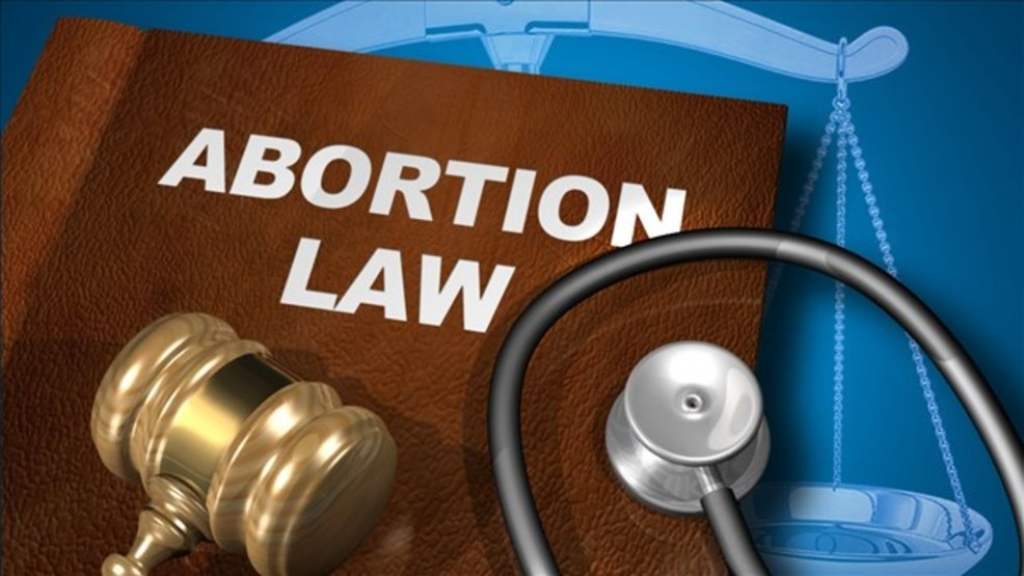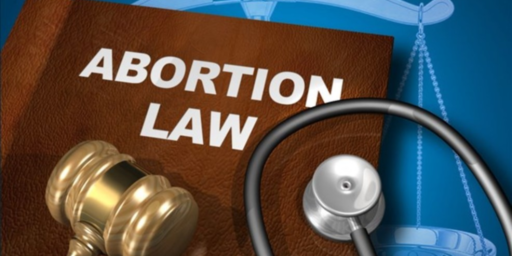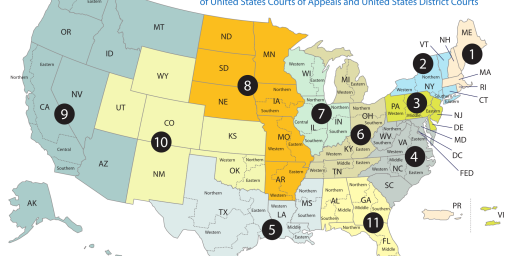Fifth Circuit Blocks Mississippi Ban On Abortions After 15 Weeks
The Fifth Circuit Court of Appeals has blocked a Mississippi law that banned nearly all abortions after the 15th week of pregnancy.

The Fifth Circuit Court of Appeals has upheld a lower court ruling blocking the implementation of a new Mississippi law that purports to ban abortion at 15 weeks:
The Fifth Circuit Court of Appeals struck down Mississippi’s 15-week abortion ban on Friday, the latest legal blow to an effort by a conservative-leaning state looking to restrict abortion.
None of the bans passed by Mississippi and eight other states this year restricting abortion past a certain point in pregnancy have gone into effect, with most of them having been blocked by federal judges.”
States may regulate abortion procedures prior to viability so long as they do not impose an undue burden on the woman’s right, but they may not ban abortions,” US Appeals Court Judge Patrick Higginbotham wrote in the ruling Friday night. “The law at issue is a ban. Thus, we affirm the district court’s invalidation of the law.”
“Prohibitions on pre-viability abortions … are unconstitutional regardless of the State’s interests,” added Higginbotham, who said the the ban’s “obstacle is insurmountable, not merely substantial” for women in Mississippi seeking to obtain an abortion
A federal judge in Mississippi struck down the law in November 2018, after Republican Gov. Phil Bryant signed the law earlier that year. The law made exceptions only for medical emergencies or cases in which there’s a “severe fetal abnormality,” but not for incidents of rape or incest. The case was appealed, leading to Friday night’s ruling.
CNN has reached out to Bryant’s office for comment Friday night.
The Center for Reproductive Rights, which brought the lawsuit on behalf of health care providers, praised the ruling on what it called “the first of the recent bans to reach a federal appellate court.”
“The Fifth Circuit recognized today what is obvious: Mississippi’s abortion ban defies decades of Supreme Court precedent,” Hillary Schneller, a senior CRR staff attorney who litigated the case, said in a statement.
“With this ruling, Mississippi — and other states trying to put abortion out of reach — should finally get the message,” she added. “Instead of wasting taxpayer dollars to defend multiple abortion bans that won’t stand up in court, they should be working on other issues — like addressing the state’s alarming maternal mortality rates.”
This ruling from the Fifth Circuit, which it should be noted is among the most conservative Courts of Appeal in the country, comes roughly a year and a half after Mississippi passed what was clearly one of the most restrictive laws regulating abortion rights since the Supreme Court handed down its decision in Roe v. Wade forty-five years ago. Previously, most states had tried to ban or severely restrict abortion rights at roughly the 20th week of pregnancy, or roughly around the same time that a fetal heartbeat could be detected. Each of these laws was eventually struck down by the Federal Courts, as were other efforts to attack abortion rights such as the law passed by Texas purporting to regulate abortion clinics in the same manner they do hospitals and other medical facilities, the result of which was to effectively shut down most of the clinics in the state. This law was eventually struck down by the U.S. Supreme Court in a 2016 decision that reaffirmed both Roe and Planned Parenthood v. Casey, the 1989 case that had been the most recent challenge to the central holding in Roe. As it stands, none of the cases dealing with the 20-week ban or the fetal heartbeat issue have made their way to the Supreme Court. The Roe and Casey decisions were effectively sustained in Whole Woman’s Health v. Hellerstadt, a 2016 decision which dealt with a Texas law that purported to use the state’s power to regulate the practice of medicine as a means of restricting access to abortion for many women, especially in the more rural parts of the state.
The Texas ruling in 2016 is significant precisely because it reaffirmed not only the decision in Casey but also the central logic of Roe itself and the question of when and how the state can restrict a woman’s ability to have access to an abortion. This arguably sends the signal that the forty-three-year-old precedent in Roe is unlikely to be kicked to the curb by this Court or, depending on the election results, any Court in the foreseeable future. Indeed, thanks to concepts such as stare decisis the longer Roe remains good law the less likely it is that the Court will overturn the cases central holding and return the nation to the status quo that existed prior to January 1973. Obviously, Mississippi’s legislators and Governor either did not get that message or are deliberately ignoring it.
In any case, the Mississippi was immediately challenged and a Judge issued an injunction was put in place barring enforcement of the law pending resolution of the case. One year ago, a Federal District Court Judge blocked the law from going into effect. It is that ruling that was upheld by the Fifth Circuit in this ruling. In addition to this law, and while the 15-week law was being litigated, Mississippi passed an even more restrictive law that barred nearly all abortions after six weeks. That law was also blocked by the same Judge that issued the ruling in the original 15-week case in an opinion that made clear the Judge’s frustration with a legislature that had clearly not gotten the message from his initial opinion. That ruling is also under review by the Fifth Circuit and will likely result in a similar outcome to this ruling.
These laws are not meant to actually go into effect, of course. It’s clear that the legislators passing laws like this are fully conscious of the fact that this new law is a direct challenge to existing case law on abortion that is clearly designed to test the Supreme Court’s ruling in Roe and the cases that followed. As with the other state laws that I note above, it seems clearly designed to provoke a court challenge that advocates hope would lead to Roe being overturned or severely restricted in its applicability in a manner that makes it far easier for states to restrict abortion rights. This, of course, is what makes the recent confirmation of Brett Kavanaugh to the Supreme Court significant. While he was a conservative, Justice Kennedy, who Kavanaugh replaced on the high court, was also a Justice who recognize the importance of precedent and the reliance that millions of Americans have placed on a precedent that now stretches back more than four decades. Laws like the one passed in Mississippi are clearly intended to challenge the central decision in Roe and to open the door to more restrictions on abortion at the state level. Whether they will succeed will depend in large part how the Federal Courts deal with this law and other similar laws that have been passed across the country.
In any case, the next step for the state is to go in one of two directions. One would be to seek en banc review from the full Fifth Circuit. That would require the agreement of a majority of the Circuit Court, though, and given the state of the precedent that controls this issue, it’s extremely unlikely that the court would grant the en banc request or that it would overturn the ruling of the panel in this case. The other option, of course, would be to seek review by the Supreme Court, but that, of course, would require at least four Justices to agree to hear the case and even with the current conservative majority it’s unlikely that the Court will seek to involve itself in the abortion issue via a case that abides by current precedent.
Here’s the opinion:
Jackson Women’s Health … by Doug Mataconis on Scribd






Roe being overturned would be the absolute worst thing to happen to the GOP in an election year. Given how many voters are single-issue – namely, THIS issue – it would gut their base severely. Voters won’t stick around since the assumption would be it would be illegal until an new law managed to get passed Congress and even if it did, the SC would deal with it. You’d see Dem wins all over from the sheer fact of single-issue voters just not showing up anymore.
Kavaunagh, if he has any brains in his head at all, would grasp this. The GOP has been riding this pony for decades and making a killing. Finally delivering on the promise means bye-bye money and power possibly forever since they’re a party on the decline. It’s killing the golden goose and Boof might be questionable but I’m not convinced he’s that big of a fool. He knows where the money comes from….
Polling generally does not reflect this. The country is actually pretty closely divided on support for abortion.
Most support legal abortion, but with substantial restrictions to make sure that sluts don’t do it, but that good, wholesome people like themselves can.
I have no idea what it would end up doing to the voter base, but it would be a lot more mixed than you would expect.